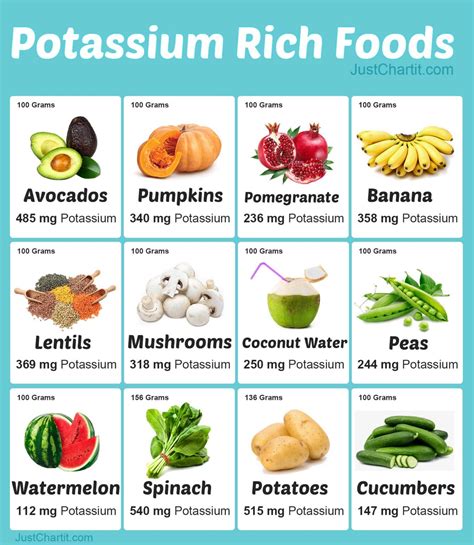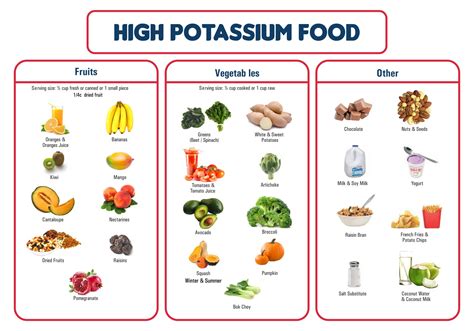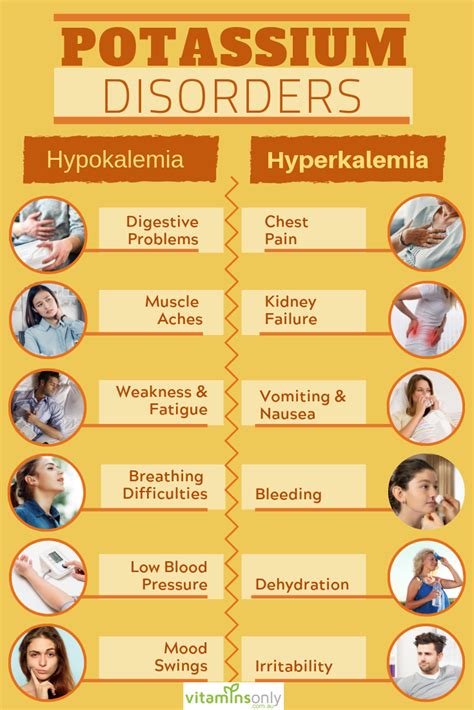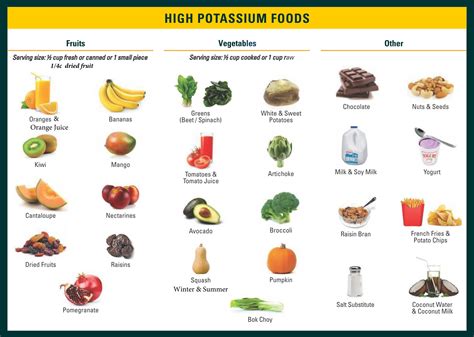Intro
Discover foods high in potassium, including bananas, leafy greens, and sweet potatoes, to boost heart health and reduce blood pressure with potassium-rich diets and nutrition plans.
Potassium is an essential mineral that plays a crucial role in maintaining various bodily functions, such as regulating blood pressure, supporting healthy heart function, and aiding in muscle recovery. Despite its importance, many individuals fail to consume sufficient amounts of potassium in their diets. The recommended daily intake of potassium is 4,700 milligrams for adults, but the average person consumes only about half of this amount. This deficiency can lead to a range of health issues, including fatigue, weakness, and increased risk of heart disease. Fortunately, there are many delicious and nutritious foods that are high in potassium, making it easy to incorporate this essential mineral into your diet.
A well-balanced diet that includes a variety of whole foods can provide adequate amounts of potassium. Fresh fruits, vegetables, whole grains, and lean proteins are all excellent sources of potassium. Some of the richest sources of potassium include leafy greens, such as spinach and kale, as well as root vegetables like sweet potatoes and carrots. Fruits like bananas, avocados, and apricots are also high in potassium, making them great additions to a healthy diet. Additionally, nuts and seeds, like almonds and pumpkin seeds, are good sources of potassium and can be easily incorporated into meals or snacks.
Incorporating potassium-rich foods into your diet can have a significant impact on overall health and wellbeing. Potassium helps to regulate fluid balance in the body, which can aid in reducing blood pressure and promoting healthy heart function. It also plays a crucial role in muscle function and recovery, making it an essential mineral for athletes and individuals who engage in regular physical activity. Furthermore, potassium can help to reduce the risk of certain health conditions, such as kidney stones and osteoporosis. With so many delicious and nutritious foods high in potassium, it's easy to make informed dietary choices that support overall health and wellbeing.
Benefits of Potassium-Rich Foods

Top Potassium-Rich Foods
Some of the richest sources of potassium include: * Leafy greens, such as spinach and kale * Root vegetables, like sweet potatoes and carrots * Fruits, such as bananas, avocados, and apricots * Nuts and seeds, like almonds and pumpkin seeds * Whole grains, such as brown rice and quinoa * Lean proteins, like chicken and fishFood Groups High in Potassium

Practical Tips for Increasing Potassium Intake
Incorporating potassium-rich foods into your diet can be easy and delicious. Some practical tips for increasing potassium intake include: * Eating a variety of whole foods, including fruits, vegetables, whole grains, and lean proteins. * Incorporating potassium-rich foods into meals and snacks, such as adding spinach to salads or snacking on bananas. * Cooking with potassium-rich ingredients, such as using sweet potatoes in place of regular potatoes. * Trying new potassium-rich foods, such as apricots or pumpkin seeds.Potassium Deficiency and Health Risks

Causes of Potassium Deficiency
Some of the common causes of potassium deficiency include: * Inadequate dietary intake: Failing to consume sufficient amounts of potassium-rich foods can lead to a deficiency. * Certain medications: Certain medications, such as diuretics, can increase the risk of potassium deficiency. * Underlying medical conditions: Certain medical conditions, such as kidney disease, can increase the risk of potassium deficiency. * Excessive sweating: Excessive sweating, such as during intense physical activity, can lead to a loss of potassium.Potassium-Rich Foods for Athletes and Individuals with Active Lifestyles

Practical Tips for Athletes and Individuals with Active Lifestyles
Some practical tips for athletes and individuals with active lifestyles include: * Consuming potassium-rich foods before and after exercise to support healthy muscle function and recovery. * Incorporating potassium-rich ingredients into meals and snacks, such as adding spinach to smoothies or eating bananas as a snack. * Staying hydrated by drinking plenty of water and electrolyte-rich beverages.Conclusion and Final Thoughts

We invite you to share your thoughts and experiences with potassium-rich foods in the comments section below. Have you noticed any benefits from incorporating potassium-rich foods into your diet? Do you have any favorite potassium-rich foods or recipes? Share your stories and help others learn about the importance of potassium for overall health and wellbeing.
What are the symptoms of a potassium deficiency?
+A potassium deficiency can cause a range of symptoms, including fatigue, weakness, muscle cramps, and heart palpitations.
How can I increase my potassium intake?
+Incorporating potassium-rich foods into your diet is the best way to increase your potassium intake. Some of the richest sources of potassium include leafy greens, root vegetables, fruits, and whole grains.
Are there any risks associated with consuming too much potassium?
+Yes, consuming too much potassium can cause a range of health problems, including muscle weakness, fatigue, and heart arrhythmias. It is essential to consume potassium in moderation and as part of a balanced diet.
